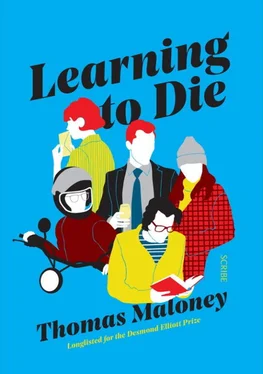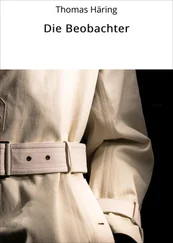Upstairs, the boy’s triumphant grin crumples into a frown.
‘Why are all your things packed up?’
‘I’m moving to Whitters. Whitby. I’ll miss you.’ Hugo’s frown deepens to its full tectonic grandeur.
‘Why?’
‘Because I’ve found a job there.’
‘You already have a job. You’re a—’
‘I know, but I thought I’d try something different.’
Hugo perches on the edge of the bed, still frowning, legs kicking to further express his agitation.
‘Can we go and sit on the fish and chips bench?’
‘We can try. Last time I went up there, about twelve hikers were trying to squeeze on at once. I’ll just skip to the loo.’
After James has left the room, Hugo’s eyes wander dolefully over the empty shelves and gaping wardrobe. He recognises a small rectangular shadow on one door as the former site of James’ faded cut-out picture of the staring man with glasses, moustache and brimmed hat, now gone. His gaze finds its way to the rubbish bin, which is crammed with papers. Yes, the picture is in there, and beneath it what looks like an unfinished letter. There’s an addressed envelope, too.
Hugo lifts these items out — then, hearing James’ tread on the stairs, stuffs them into the writer’s notebook that he proudly keeps in the pocket of his shorts.
The latch on the Mocks’ front door has been changed and lowered, after Dan found himself unable to admit his physiotherapist last week. Even his customised litter-picker failed him, and the consultation took place through the letter slot.
He hooks his weak fingers over the new latch and reverses the chair so the door can swing into the hall. There they are: his mother and father, laden with bags. There is still something unsettling about looking up at them rather than down, a familial ache so tangled in all the other sadness that he doesn’t examine it too closely.
Age is making of them something slightly comical, but no less lovable. His mother was fine-looking, an auburn warmth in the dark hair that she has always — except a brief bob-stint in the eighties — worn long. She probably dyes it now, but he doesn’t know for sure. He has a theory that the moment she stopped believing in her physical impact, it disappeared like a broken spell.
Physical impact is not a concept anyone would associate with Dan’s father, who, though an ingenious, energetic and honourable man, has always had the bearing and features of a squirrel. His shoulders are stooped and narrow, and his face has a puckered look as though not quite finished, not fully inflated — a trait visible but mercifully diluted in the faces of Dan and his sister. Dan remembers painfully acknowledging to himself his father’s shortcomings, sometime in his mid-teens while watching Mr Mock and Big Vince Vickers in conversation after a school function: mouse and man.
Of course, the physical ageing process seems laughably benign beside his own degeneration. It’s the behavioural changes that Dan really notices — the bickering of new retirees with time on their hands, the fussing, the stories told or questions asked twice over, the missed cues, the odd habits, the pullovers worn on warm days.
He and his father discuss modifications that might be made to his wheelchair — an ongoing project that brings both pleasure — and everyone teams up to move him to the sofa while the old man sets to work. Each time Dan leaves the chair, marooned now wherever he’s put, he recognises its transformative powers — powers not unlike those of the much-missed Yamaha, but with a different frame of reference. He calls the chair Shadowfax.
With Natalie, who has been promised and fully deserves a day to herself, he exchanges a nod of understanding, that she is to relax and not worry about him, and that their bombshell of a secret is safe, as agreed. She leaves the house briskly, carrying, for once, nothing but a small handbag. Mr Mock then steps out to buy some parts from the electrical shop, leaving Dan alone with his mother. She offers him more cushions; offers him tea; offers him a shoulder rub.
‘Mum, you don’t have to nurse me.’
‘I’m not nursing you,’ she retorts, straightening his pile of science magazines. ‘I’m mothering you. Deal with it.’
The sliding doors snub Natalie for just long enough to break her step and slop a scalding dribble of coffee over her thumb, then grudgingly part. She enters the busy station and selects one of the intersecting queues for the various banks of ticket machines. It’s a jolly, Saturday-morning crowd, bound for early-season football matches, open-air concerts and days out with the kids. In front of her: a silent young couple carrying huge rucksacks, holding hands, destined for adventure. Natalie feels a flash of envy, but she too is free today. A day off. Dan-free. Time, at last, to reflect on the damage she has caused.
Dan said he could never have done what she did. He’s right — both because he is not a schemer (his intended meaning) and (more to the point) because he wouldn’t have got away with it. In his place, she would have recognised that the matter of babies wasn’t closed. His observation echoes the subtext of most of their quarrels: the moral gradient between thoughtlessness (Dan) and meanness (Nat) — which way does it tilt? Most people, in Natalie’s experience, tend towards one fault or the other, probably because in the face of sporadic thoughtlessness — the box of chocolates finished off accidentally, the forgotten favour, the mood cues missed — the considerate must occasionally resort to calculated meanness to even the score.
This time it’s different, of course, the scale unprecedented, the consequences profound. Dan hasn’t mentioned the possibility of terminating the pregnancy: he knows his rightful jurisdiction, as a man, and as — she feels the hot prick of tears — as the one to whom it soon won’t matter one way or the other.
A commotion in the queue behind turns her head: a pushchair has tipped backwards under the weight of a bag hung from its handles. The baby is safely strapped in but startled, and lets out a choking scream. The parents right the pushchair but don’t think to comfort its occupant — or are weary of comforting. They argue instead. The baby can’t see them and cranes its head wildly, then fixes wide, streaming eyes on Natalie. It freezes for a moment, out of puff, then hauls in another lungful and flings it out with ear-splitting abandon.
Her heart lurches: in all her long experience with images of suffering, she has never seen such a hysterical mask of misery.
‘It’s got some poke,’ murmurs Mr Mock admiringly, as he accelerates the Motability car down the M4 slip road. Dan smiles: he hasn’t been alone with his father for a long time. Mrs Mock is following in the other car; if she loses them, she has the satnav.
Dan turns to look at his father’s familiar, mousy profile. The baby bombshell has changed everything, including his feelings for his parents. They will be overjoyed, of course — they never had the option of starting again after he’s gone. Before, Dan’s overriding urge when he saw them was simply to apologise for amounting to nothing, despite all their patient parenting efforts. Now there is something, but it’s a gift given unwillingly. The guilt remains.
‘I don’t really know how to say this,’ he begins, without clear intention. ‘I know it’s not my fault that I’ve got this disease — but — I still want to say sorry. I’m sorry that I’ll never be able to repay what you and Mum invested in me. Or even put it to good use. Instead, I’m just taking more. More looking after, more worrying. And this time — it’s all for nothing.’
The car is noisy and Dan’s voice, a mewing monotone now, doesn’t project. But his father gets the gist. Mr Mock shakes his head slowly, keeping his eyes on the road.
Читать дальше












